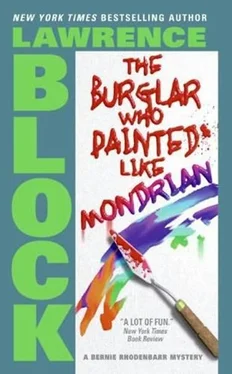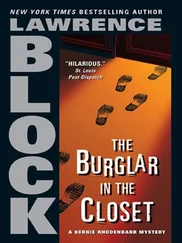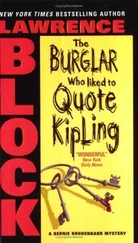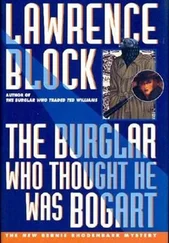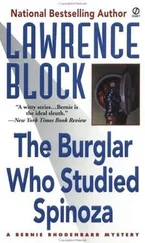
Lawrence Block
The Burglar Who Painted Like Mondrian
A book in the Bernie Rhodenbarr series
This is for
Lynne Wood
with special thanks to
Michael Trossman
who taught me how to prepare the canvas
and
Laurence Anne Coe
who helped me assemble the frame
It was a slow day at Barnegat Books, but then most of them are. Antiquarian booksellers, after all, do not dream of retiring to the slow and simple life. They are already leading it.
This particular day had two high points, and as luck would have it they both came at once. A woman read me a poem and a man tried to sell me a book. The poem was “Smith, of the Third Oregon, Dies,” by Mary Carolyn Davies, and the woman who read it was a slender and fresh-faced creature with large long-lashed brown eyes and a way of cocking her head that she must have learned from a feathered friend. Her hands-small and well formed, unringed fingers, unpolished nails-held a copy of Ms. Davies’ first book, Drums in Our Street, which the Macmillan Company had seen fit to publish in 1918. And she read to me.
“Autumn in Oregon -I’ll never see
Those hills again, a blur of blue and rain
Across the old Willamette. I’ll not stir
A pheasant as I walk, and hear it whirr
Above my head, an indolent, trusting thing…”
I’m rather an indolent, trusting thing myself, but all the same I cast a cold eye on the Philosophy amp; Religion section, where my most recent visitor had stationed himself. He was a hulking sort, late twenties or early thirties, wearing low Frye boots and button-fly Levi’s and a brown wide-wale corduroy jacket over a darker brown flannel shirt. Horn-rimmed glasses. Leather elbow patches on the jacket. A beard that had been carefully trimmed. A headful of lank brown hair that had not.
“When all this silly dream is finished here,
The fellows will go home to where there fall
Rose petals over every street, and all
The year is like a friendly festival…”
Something made me keep my eyes on him. Perhaps it was an air about him, a sense that he might at any moment commence slouching toward Bethlehem. Maybe it was just his attaché case. At Brentano’s and the Strand you have to check bags and briefcases, but my customers are allowed to keep them at hand, and sometimes their carryalls are heavier upon departure than arrival. The secondhand book trade is precarious at best and one hates to see one’s stock walk out the door like that.
“But I shall never watch those hedges drip
Color, not see the tall spar of a ship
In our old harbor.-They say that I am dying,
Perhaps that’s why it all comes back again:
Autumn in Oregon and pheasants flying-”
She let out a small appreciative sigh and closed the little book with a snap, then passed it to me and asked its price. I consulted the penciled notation on its flyleaf and the tax table that’s taped to my counter. The last hike boosted the sales tax to 8 1?4 percent, and there are people who can figure out that sort of thing in their heads, but they probably can’t pick locks. God gives us all different talents and we do what we can with them.
“Twelve dollars,” I announced, “plus ninety-nine cents tax.” She put a ten and three singles on the counter, and I put her book in a paper bag, fastened it with a bit of Scotch tape, and gave her a penny. Our hands touched for an instant when she took the coin from me, and there was a bit of a charge in the contact. Nothing overpowering, nothing to knock one off one’s feet, but it was there, and she cocked her head and our eyes met for an instant. The author of a Regency romance would note that a silent understanding passed between us, but that’s nonsense. All that passed between us was a penny.
My other customer was examining a buckram-bound quarto volume by Matthew Gilligan, S. J. The Catogrammatic vs. the Syncogrammatic, it was called, or was it the other way around? I’d had the book ever since old Mr. Litzauer sold me the store, and if I’d never dusted the shelves it would never have been picked up at all. If this chap was going to steal something, I thought, let him hook that one.
But he returned Father Gilligan to his shelf even as Mary Carolyn Davies went out the door with my demure little poetry lover. I watched her until she crossed my threshold-she was wearing a suit and matching beret in plum or cranberry or whatever they’re calling it this year, and it was a good color for her-and then I watched him as he approached my counter and rested one hand on it.
His expression, insofar as the beard showed it, was guarded. He asked me if I bought books, and his voice sounded rusty, as if he didn’t get too many chances to use it.
I allowed that I did, if they were books I thought I could sell. He propped his attaché case on the counter, worked its clasps, and opened it to reveal a single large volume, which he took up and presented to me. Lepidopterae was its title, François Duchardin was its author, and Old World butterflies and moths were its subject matter, discussed exhaustively (I can only presume) in its French text and illustrated spectacularly upon its color plates.
“The frontispiece is missing,” he told me, as I paged through the book. “The other fifty-three plates are intact.”
I nodded, my eyes on a page of swallowtail butterflies. When I was a boy I used to pursue such creatures with a homemade net, killing them in a mason jar, then spreading their wings and pinning them in cigar boxes. I must have had a reason for such curious behavior, but I can’t begin to imagine what it might have been.
“Print dealers break these up,” he said, “but this is such a desirable volume and in such good condition I thought it really ought to go to an antiquarian book dealer.”
I nodded again, this time looking at moths. One was a cecropia. That and the luna are the only moths I know by name. I used to know others.
I closed the book, asked him what he wanted for it.
“A hundred dollars,” he said. “That’s less than two dollars a plate. A print dealer would charge five or ten a plate, and he’d get that easily from decorators.”
“Could be,” I said. I ran my finger over the book’s top edge, where a rectangle enclosed the stamped words New York Public Library. I opened the book again, looking for a Withdrawn stamp. Libraries do divest themselves of books, just as museums deaccession some of their holdings, though Duchardin’s Lepidopterae hardly seemed a candidate for such treatment.
“Those overdue charges can mount up,” I said sympathetically, “but they have these amnesty days now and then when you can return overdue books with no penalty. It seems unfair to those of us who pay our fines without protest, but I suppose it does get books back in circulation, and that’s the important thing, isn’t it?” I closed the book again, set it deliberately into his open attaché case. “I don’t buy library books,” I said.
“Somebody else will.”
“I don’t doubt it.”
“I know one dealer who has his own Withdrawn stamp.”
“I know a carpenter who drives screws with a hammer,” I said. “There are tricks to every trade.”
“This book didn’t even circulate. It sat in a locked case in the reference section, available by special request only, and because of its value they found ways to avoid letting people have access to it. The library’s supposed to serve the public, but they think they’re a museum; they keep their best books away from people.”
Читать дальше
